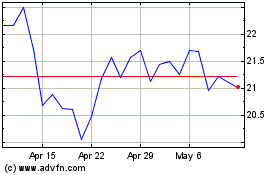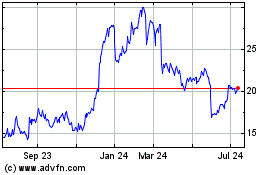Radio Shack Files for Bankruptcy Protection, Again -- Update
March 08 2017 - 10:36PM
Dow Jones News
By Patrick Fitzgerald and Drew FitzGerald
RadioShack owner General Wireless Operations Inc. filed for
chapter 11 protection Wednesday night, the electronics retailer's
second trip to bankruptcy court in as many years after a
partnership with wireless provider Sprint Corp. failed to yield
dividends.
The Fort Worth, Texas, company has already started closing
roughly 200 stores and said it is "evaluating options" on its
remaining 1,300 retail outlets.
The latest bankruptcy filing caps a long decline for the nearly
100-year-old brand that was once considered the go-to place for new
technology.
"Since emerging from bankruptcy two years ago as a privately
owned company, our team has made progress in stabilizing operations
and achieving profitability in the retail business, while our
partner Sprint managed the mobility business," chief executive Dene
Rogers said.
However, the "surprisingly poor" performance of mobility sales,
managed by Sprint, was among one of the main factors that led to
the latest chapter 11 filing.
"While the retail business progressed, the Sprint relationship
did not yield the benefits that the [General Wireless]
anticipated," Mr. Rogers said in court papers filed Wednesday. He
added that the reorganized company had worked on its retail
business and pursued marketing partnerships with businesses
including Amazon, Comcast, FedEx and Hulu.
RadioShack filed for chapter 11 bankruptcy protection in
February 2015 and shut down or sold off almost all of its
4,000-store chain, trying to pay off more than $1 billion in
debt.
Hedge fund Standard General, through its General Wireless
affiliate, won a bankruptcy auction for RadioShack and sought to
revive the brand around a streamlined array of necessities, to be
sold alongside Sprint wireless products. Sprint allied with the
hedge fund in keeping more than 40% of RadioShack's
brick-and-mortar outlets open.
But the turnaround strategy never panned out. If mobile sales
had picked up, Mr. Rogers said General Wireless would have been
able to raise new capital, pay down debt and eventually become a
financially stable company.
Instead, Sprint mobility sales "dropped off precipitously in the
fourth quarter of 2016," which called "the original arrangement
into question," Mr. Rogers said in court papers.
A Sprint spokesman said RadioShack's bankruptcy filing and
subsequent store closings aren't material to Sprint's overall sales
results. The company has reached a deal General Wireless to scrap
their partnership and will convert several hundred
Sprint-RadioShack outlets into Sprint corporate-owned stores. In
return, Sprint will pay General Wireless $17 million under the
settlement, which requires bankruptcy court approval.
In recent years, RadioShack has faced competition in the
cellphone business from stores owned by wireless providers as well
as handset makers like Apple Inc. The company has also felt
pressure from online retailer Amazon.com Inc. as consumers migrated
to online purchases of high-margin accessories, such as cables and
batteries, that long fueled its business.
The company's capital structure includes roughly $25.5 million
in first-lien term loans, nearly $40 million in junior-term loan,
and a $23 million intellectual property loan. Additionally, General
Wireless owes about $62.9 million to trade creditors of which
roughly $52.6 million is owed to vendors and creditors and about
$10.2 million is unpaid prebankruptcy debt.
The case, which was filed in the U.S. Bankruptcy Court in
Wilmington, Del., is being handled by law firm Pepper Hamilton LLP.
The case number is 17-10506.
Write to Patrick Fitzgerald at patrick.fitzgerald@wsj.com and
Drew FitzGerald at andrew.fitzgerald@wsj.com
(END) Dow Jones Newswires
March 08, 2017 22:21 ET (03:21 GMT)
Copyright (c) 2017 Dow Jones & Company, Inc.
SentinelOne (NYSE:S)
Historical Stock Chart
From Mar 2024 to Apr 2024

SentinelOne (NYSE:S)
Historical Stock Chart
From Apr 2023 to Apr 2024
